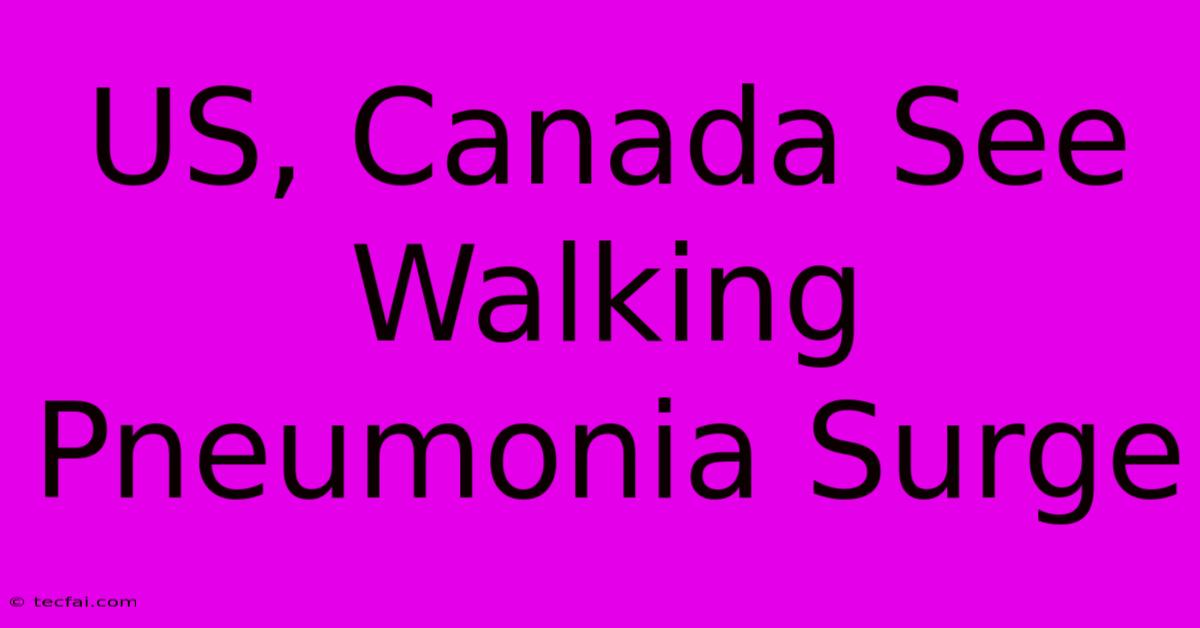US, Canada See Walking Pneumonia Surge

Discover more detailed and exciting information on our website. Click the link below to start your adventure: Visit Best Website tecfai.com. Don't miss out!
Table of Contents
US, Canada See Walking Pneumonia Surge: What You Need to Know
The United States and Canada are experiencing a significant surge in cases of walking pneumonia, also known as atypical pneumonia. This respiratory infection, while typically less severe than other forms of pneumonia, is causing concern due to its rapid spread and potential complications. Understanding the causes, symptoms, and preventative measures is crucial for protecting yourself and your community.
What is Walking Pneumonia?
Walking pneumonia is a form of pneumonia caused primarily by Mycoplasma pneumoniae, a type of bacteria smaller than most other bacteria. Unlike typical pneumonia caused by viruses or other bacteria, walking pneumonia often presents with milder symptoms, allowing individuals to remain active – hence the name "walking pneumonia." However, this doesn't diminish its contagiousness or potential for complications. It spreads through respiratory droplets produced when an infected person coughs or sneezes.
Distinguishing Walking Pneumonia from Other Illnesses
While often milder than other pneumonias, walking pneumonia shouldn't be taken lightly. Its symptoms can overlap with common colds and the flu, making diagnosis challenging. Key differences include:
- Duration: Walking pneumonia symptoms can persist for several weeks, unlike the typical shorter duration of a cold or flu.
- Persistent Cough: A dry, persistent cough is a hallmark of walking pneumonia, often accompanied by a low-grade fever.
- Fatigue and Malaise: Extreme tiredness and a general feeling of unwellness are common and more pronounced than with a simple cold.
- Headache and Muscle Aches: These symptoms are less prevalent in the common cold but more typical in walking pneumonia.
If you experience these symptoms, particularly a persistent cough lasting longer than a week, it’s crucial to consult a healthcare professional for proper diagnosis and treatment.
The Current Surge: Reasons and Concerns
The exact reasons behind the current surge in walking pneumonia cases in the US and Canada remain unclear. However, several factors may be contributing:
- Post-Pandemic Immunity: Reduced exposure to various respiratory viruses during the COVID-19 pandemic may have weakened overall immunity, making individuals more susceptible to infections like walking pneumonia.
- Seasonal Variations: Respiratory infections, including walking pneumonia, tend to surge during specific seasons, potentially influenced by weather patterns and increased close contact indoors.
- Reduced Vaccination Rates: While no specific vaccine exists for Mycoplasma pneumoniae, maintaining overall good health through vaccination against other respiratory illnesses can contribute to stronger immunity.
The increase in cases is concerning due to the potential for complications, including bronchitis, ear infections, and in rare cases, more serious respiratory issues. Children, the elderly, and individuals with weakened immune systems are particularly vulnerable.
Prevention and Treatment
Prevention focuses on hygiene practices and general health:
- Frequent Handwashing: Washing your hands frequently and thoroughly with soap and water is the most effective preventative measure.
- Respiratory Etiquette: Covering your mouth and nose when coughing or sneezing and avoiding close contact with sick individuals can help reduce the spread.
- Boosting Immunity: Maintaining a healthy lifestyle through proper nutrition, adequate sleep, and regular exercise strengthens the body's defenses against infection.
Treatment typically involves antibiotics prescribed by a doctor. Early diagnosis and treatment can significantly reduce the duration and severity of the illness. Over-the-counter medications can help manage symptoms like cough and fever, but it's essential to seek medical advice before using them.
Staying Informed and Proactive
Staying informed about the current situation and taking proactive steps to protect yourself and your family is crucial. Monitor local health advisories, maintain good hygiene practices, and consult a healthcare professional if you experience symptoms suggestive of walking pneumonia. Early intervention is key to managing this contagious respiratory illness effectively. By understanding the risks and taking appropriate precautions, we can collectively mitigate the impact of this current surge in walking pneumonia cases.

Thank you for visiting our website wich cover about US, Canada See Walking Pneumonia Surge. We hope the information provided has been useful to you. Feel free to contact us if you have any questions or need further assistance. See you next time and dont miss to bookmark.
Featured Posts
-
Harbaugh Previews Ravens Chargers Game
Nov 26, 2024
-
Drake Umg Spotify Inflate Kendricks Song
Nov 26, 2024
-
Microsoft Down Global Outage Report
Nov 26, 2024
-
Champions League Probable Lineups Matchday 5
Nov 26, 2024
-
Swertres 9 Pm Resulta Nobyembre 24 2024
Nov 26, 2024
